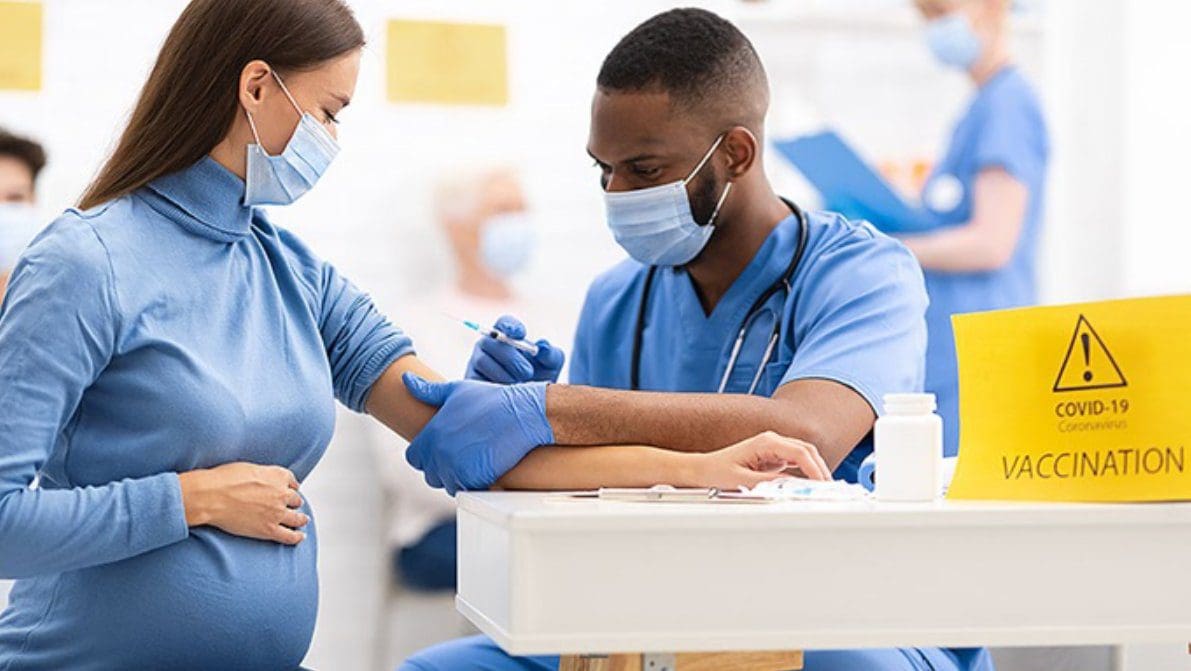

Study Finds 17% Higher Miscarriage Rate in the Vaccinated But Pretends it Doesn’t
A few days ago, I came across Dr. Viki Male, qualified with a science PhD in pathology rather than a medical degree, who lectures in reproductive immunology at Imperial College London. Dr. Male, cocooned in a white coat to provide the necessary medical gravitas, was the star of an NHS video promoting COVID-19 ‘vaccinations’ (more properly experimental gene-based therapies) to pregnant mothers.
Now it is a fact that pregnant mothers were deliberately excluded from the clinical trials of all the COVID-19 vaccines. It follows that we have no data on the safety of these experimental medications from properly designed trials in which outcomes for treated and untreated pregnant women are compared. Neither do we have any long-term data on the effects of these experimental medical treatments on mothers and their unborn children. Without this evidence to support her case, Dr. Male’s strident promotion of the COVID-19 vaccines to pregnant mothers could only have been based on a belief that they do no harm, rather than on any scientific proof.
However, Dr. Male did seem very sure of herself, despite her exposed position. I therefore determined to look at the quality of the data that she used to shore up her belief system. Like Dr. Male I am qualified with a Ph.D. in biology, and throughout my career I have been involved in the peer review process, assessing the scientific quality of papers to determine whether they meet the standards required for publication. Dr. Male, in response to criticism of the NHS video on her Twitter feed, gave great prominence to a recently published paper from a group led by Professor Sarah Stock at Edinburgh University entitled “Early pregnancy outcomes following COVID-19 vaccination and SARS-CoV-2 infection: a national population-based matched cohort study“. I therefore determined to review this paper myself, and assess whether the analyses that it presented supported the conclusions that had been drawn, and whether the manuscript was worthy of publication.
My verdict is that if I were a reviewer of this paper, I would unequivocally reject it on the grounds that the data on which it is based are unsound, that it fails to analyse the crucial interaction between vaccination status and SARS-CoV-2 infection, and that the conclusions drawn are not supported by the results presented. Indeed, the only significant result to emerge from the study is that there were higher odds of early miscarriage among women receiving the AstraZeneca vaccine when compared to historical controls (17% higher: adjusted odds ratio 1.17; 95% CI:1.03-1.34). I outline the full reasons for my verdict below.
The paper retrospectively compares matched cohorts of vaccinated and unvaccinated women to assess whether they differed in the frequency of either pregnancy loss in the first 20 weeks or ectopic pregnancy. Comparisons in the frequency of these deleterious outcomes were also made between cohorts of pregnant women who did, or did not, test positive for the SARS-CoV-2 virus. In order to assess the overall quality of the research, it is first important to determine the quality of the data on which it is based.
The research is critically dependent on unambiguous classification of individuals into the categories vaccinated or unvaccinated, infected or uninfected. The authors concede that there may be significant problems here:
We had to rely on imputed gestation at end of pregnancy for a high proportion of pregnancies ending in early loss, which may have led to misclassification of vaccination or infection status.
Specifically, if the total length of the pregnancy was not known it was assumed to be uniformly 10 weeks for miscarriages or eight weeks for ectopic pregnancies. Making these assumptions could lead to misclassification of the vaccination or infection status of individuals.
Secondly, the research depends on accurate recording of rates of miscarriage. Again, there are problems with these data:
We could not include early miscarriages where the woman did not seek healthcare advice.
Finally, the distinctive point of this study, that it involves matched cohorts that do not differ for confounding factors, is thrown into doubt by the admission that three key factors, well known to influence pregnancy outcomes, were not matched:
We were not able to adjust for body mass index (BMI) or smoking; or include diabetes in clinical vulnerability scores.
The next area for scrutiny is how these compromised datasets were analysed. Two features of the treatment of the data are concerning. Firstly, before comparison of the vaccinated and unvaccinated cohort was performed, all women with a positive SARS-CoV-2 test during the study period were excluded. Secondly, before pregnant women with and without a SARS-CoV-2 positive test were compared, all vaccinated individuals were excluded.
The effect of these exclusions is that the interaction between vaccination status and presence or absence of SARS-CoV-2 on pregnancy outcomes is ignored. This is a serious omission because vaccination takes place in the presence of SARS-CoV-2 in the community (the whole reason that vaccination is being promoted). Therefore, we need to study the effect of vaccination in the presence of SARS-CoV-2 infections, not in their complete absence. A major reason for doing this is that recent data suggest not only that vaccination does not prevent infection by SARS-CoV-2, but that vaccine recipients may have a higher chance than unvaccinated of testing positive for SARS-CoV-2 and suffering from COVID-19. If we ignore this effect by excluding individuals who are SARS-CoV-2 positive, we are not obtaining a true comparison of the real-world effects of vaccination on pregnancy outcomes.
Notwithstanding these serious flaws in the analysis, we can now look at the results that were obtained and the conclusions that were drawn from them by the authors. Looking across all the data presented, no significant effect of SARS-CoV-2 infection on early pregnancy outcomes was detected in this study. The only significant result to arise from the study was that there were higher odds of early miscarriage among women receiving the AstraZeneca vaccine when compared to historical controls (17% higher: aOR 1.17; 95% CI1.03-1.34). Therefore, the conclusion that should be drawn from this study is that there is no evidence that SARS-CoV-2 infection poses a risk to early pregnancy outcomes, but that vaccination with the AstraZeneca vaccine increases the risk of early miscarriage.
Curiously, this is the inverse of what the authors actually concluded in their manuscript:
Overall, our analyses found no evidence of an increased risk for miscarriage or ectopic pregnancy after COVID-19 vaccination, supporting current recommendations that vaccination remains the safest way for pregnant women to protect themselves and their babies from COVID-19.
So, Dr. Male, this is the standard of scientific evidence upon which you base your advocacy of the COVID-19 vaccines for pregnant women. The only significant result that comes from the study suggests that at least one of the vaccines increases the risk of early miscarriage. I believe the only honourable thing for you to do is forthwith to withdraw from further promotions of the COVID-19 vaccines for pregnant women. There is more than your scientific reputation at stake. There is the future happiness of all pregnant women who place their trust in you because you have been put forward as a scientist and individual of integrity.
Dr. Richard Ennos is a retired Professor of Evolutionary Biology at Edinburgh University.







